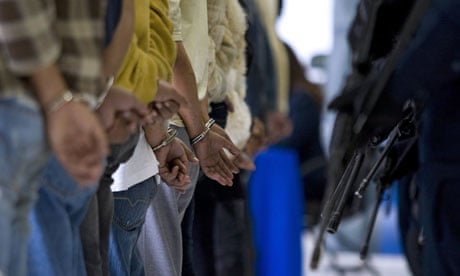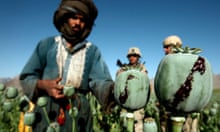If there is a "war on drugs", this is it. Mexico is undergoing worse violence than has been seen in Latin America in decades. President Felipe Calderon's decision to take the fight to the narcos has been returned with drug gang brutality on a massive scale. If any good is to come out of the tragedy afflicting Mexico, it is that the misguided global approach to drug regulation will be challenged and may, eventually, be changed.
In 2009, the former presidents of Brazil, Colombia and Mexico made a very public call for legalisation in a high-profile paper. That in itself was a significant milestone. But now a sitting president, Calderon, has said that it is time seriously to debate the idea of legalisation (although he says he opposes it). This is unprecedented. Sitting presidents are expected simply to toe the US line and support the war. But events in Mexico are so exaggerated that, for once, domestic reality appears to have trumped international realpolitik. Calderon's predecessor and fellow conservative, Vicente Fox, has also now come out pro-legalisation.
At the same time, more articles than usual are appearing in the drug-consuming west, across the political spectrum, calling for a rethink of this ridiculous "war", prompted by concerns about failed strategies in their own societies. But where are the voices of the development community? While we recognise that conflict and instability are the enemies of development and poverty reduction, we tend to stay silent when it comes to international crime. We separate it off as an area for the police, or the army, or for experts on money laundering. But the criminal production and trading of drugs deeply affects the poorest and most marginalised communities.
How? In producer countries like Afghanistan and Colombia, violent conflicts are fuelled by drugs money as gangs, guerrilla and army fight for the most lucrative land and trade routes. At a local level, farmers not already growing coca, opium poppies or marijuana for simple reasons of economic survival (they can make a lot more money growing drugs than onions), come under pressure from armed groups to get involved or face the consequences (harassment, threat and displacement – as this report by ABColombia demonstrates). Then the police or army swoops, and drug zones become war zones. The families caught up in this nightmare are the victims of an unworkable "war on drugs".
At a national level, prohibition is putting money in the pockets of criminals and armed groups. Profits from the illegal trade in drugs are not only used to buy guns, they also buy police chiefs and judges. Corruption is off the scale and, as it grows, democratic accountability, the key plank necessary for poor people to access and defend their rights, is progressively eroded.
This is a development issue. The tax campaigns gaining ground in some charities, and supported by some G20 countries, are possibly the best way in. The complex web of tax havens that has been allowed to grow up around the world serves no purpose except to hide money – handy if you are an international criminal.
But the development community needs to go further. I think it should consider actively advocating legalisation, on the basis of the harm prohibition does to the poorest. Astonishingly, over 60 % of Mexican drug gangs' profits comes from marijuana sold to the US. Marijuana. I know people that smoke marijuana with their kids but won't let them drink until they are 21. Human beings have always taken drugs and always will. Marijuana can do harm, yes, but banning it is doing much more. Our response for the last few decades has been based on transient cultural emotions rather than evidence and an understanding of history. It has been a disaster for some of the most marginalised communities in the developing world.





Comments (…)
Sign in or create your Guardian account to join the discussion